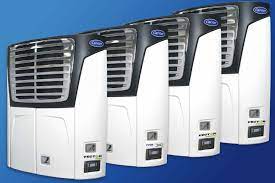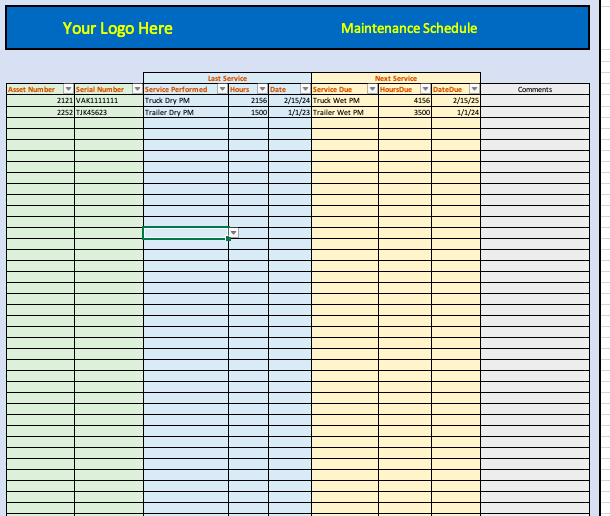Reefers are major investments and protecting them from things like accidents or severe weather is a top priority. Try as you might, there are some situations that are hard to predict, but others can be avoided through regular maintenance and inspections.
Carrier is one of the most popular companies in the transport refrigeration space, and their products can be found in thousands of trucks and refrigerated trailers nationwide. Though reliable, even Carrier products can experience issues from time to time. Some can be avoided, but others may occur without so much as a warning.
Rest assured, Crosspoint Power and Refrigeration Mobile Reefer Repair Services are always on standby to manage any unexpected issues, offering you quick and practical solutions to get your refrigeration system running smoothly again in no time.

Common Problems, Repairs, and Prevention
Crosspoint Power and Refrigeration sees every kind of repair imaginable, but the four below are the most common. Here’s how to spot them, what to do about them, and how to avoid them in the first place.
1 – Fluid or Refrigerant Leaks
Fluid and refrigerant leaks can be incredibly problematic, but the good news is that many of these leaks can be repaired easily. Before loading your reefer, check for the most common leaks. Spotting oil dripping from your engine or compressor is one thing, but when cooling issues arise, you’ll need to check the cooling capacity of the unit or the amount of refrigerant in the receiver tank to make sure your refrigerant hasn’t leaked out.
When your reefer isn’t maintaining temperature and you suspect a refrigerant leak, there are two places to check first.
- Delta T: If you suspect a refrigerant leak, the first thing you should check is the Delta T. The Delta T is a measure of the cooling capacity of the unit. It is measured by subtracting the supply air temperature from the return air temperature. To test the Delta T, turn the unit on and lower the setpoint to at least 30 degrees cooler than the box temperature. Let the unit run for about 15 minutes and observe the Delta T. You should see at least an 8 degree difference between the supply air and the return air temperature. If your Delta T isn’t at least 8 degrees F, your unit may have a cooling issue or refrigerant leak.
- Receiver Tank: If you suspect that your unit may be low on refrigerant, you should check the receiver tank. This tank is located behind the roadside door on the unit about four feet above the battery. This black cylindrical tank has two inspection ports with red balls in the part. The lower ball should appear to be floating in the inspection port.
#2 – Bulkhead Problems
When refrigerating your product, airflow is very important. A bulkhead is designed to create a barrier either between two separate compartments or between the unit and the product. There are two main types of bulkheads found in transport refrigeration. The return air bulkhead is near the refrigeration unit and controls the airflow returning to the unit. The other bulkheads found in refrigerated transport are divider bulkheads. These bulkheads create a barrier between two separate compartments.
The return air bulkhead near the refrigeration unit can suck up plastic wrapping or other packing materials, blocking the airflow going into the unit. Without airflow, the unit can not cool the product. Therefore, it’s important to check the return air bulkhead for obstructions. With divider bulkheads, it’s important to check that the bulkhead creates a good seal between the compartments to prevent heat transfer between the two compartments.
#3 – Condenser Problems
The condenser in your reefer serves as the heat exchanger, and without it, your container simply will not stay cool. A clogged condenser can cause your discharge pressure to be high. If you are getting discharge pressure alarms, check the front of the unit for the condenser. The condenser looks like a radiator, and can get clogged up with dust, dirt, road grime, and other organic materials. Using a low pressure water hose, rinse out the condenser being cautious not to damage the fins. If you are still having issues with your condenser, bring your unit to a professional who can use a special condenser cleaning solution to help dislodge some of the debris that may be caught in the condenser fins.
#4 – Load Temperature
Finally, if you have checked the three issues above and your box temperature still isn’t coming down, your box may have been loaded with improperly cooled products. For example, produce and cheese should be pre-cooled before it’s loaded in a truck, trailer, or container for transportation. Transport refrigeration units are designed to maintain temperature, not to cool down a product. If you feel like your box temperature is not coming down, and have inspected the items listed above, you may have been loaded with a product that was not pre-cooled.
Carrier Reefer Maintenance
Maintenance is one of the most important parts of caring for your Carrier reefer. There are countless moving parts that keep your cargo chilled, and if even one of those parts fails – a single dry-rotted hose, for example – it could lead to a complete cargo loss. There are two types of maintenance that should be performed regularly: driver inspections, and professional inspections.
Driver Inspections
Before loading a reefer, the driver should conduct a brief inspection to look for issues. Even if the driver is not a refrigeration expert, there are some simple and obvious things they can look for.
- Wear and Tear: Check the belts to make sure they do not look worn or damaged. Look for any signs of dry rot on the rubber hoses of the unit.
- Leaks: Inspect the fuel lines between the tank and unit. Check the engine and compressor for oil leaks. Any leaks under the engine could be a sign of future failure. Make sure the oil level and the coolant level is correct.
- Door Seals: Even a door that hasn’t been properly sealed can lead to problems. Make sure that all doors are tightly closed and the seals are in good condition so that your Carrier unit can function normally.
- Active: Once starting the unit, check the active alarms by pushing the alarm button. Some alarms will shut down the unit, while other alarms just alert the driver of an impending issue. Review these alarms and fix any potential issues before picking up a load.
- Run a Unit Pre-Trip: Finally, a driver should perform a pre-trip on the unit every day before picking up a load. The pre-trip is a unit self diagnosis tool that will check all the unit functions for normal operation. If anything is abnormal, the unit will fail the pre-trip and alert the driver to an impending problem. While pre-trips can catch many problems, they are not perfect and if you still suspect a problem it is important to reach out to your refrigeration service department to ensure your unit is running properly.
Professional Inspections and Tune-Ups
Professional inspections of your reefer are crucial for its longevity and functionality. Make sure that you follow this schedule for the best possible results.
- PM A (Dry PM)at 1,500 or 6 Months
- PM B (Wet PM)at 3,000 or 1 Year
In other words, you’ll need an inspection every 1,500 hours or 6 months, and a inspection, oil change and filter change every 3,000 hours or 1 year for most Carrier units. The Carrier Factory has set these maintenance intervals based on life cycle testing and following this schedule is an ideal way to prevent key issues.
Professionals also recommend replacing the coolant every 6,000 hours if you use a regular coolant or every 12,000 hours if you choose a coolant with extended life. Some companies will recommend changing the thermostat and water pump proactively at 12,000 hours, even if they show no signs of wear and tear.
Choosing a Carrier Reefer Professional
Reefers are complex pieces of machinery that require specialized knowledge. Heating, ventilation, and air conditioning (HVAC) companies may be able to repair home, commercial, and industrial air conditioning units, but few of them have the additional expertise required to maintain and repair reefers. When choosing professional Reefer Repair, Sales & Services, look for the following things:
- Mobile Service: Unlike a traditional cargo vehicle, the items held inside a reefer are perishable. Calling a tow truck and waiting hours just to even see a repair person can put the entire load at risk. Instead, look for a professional that offers mobile service. These companies bring their tools, knowledge, and expertise to you no matter where you are.
- Certified Master Technicians: Certified master technicians have achieved the highest possible level of certification and completed every known test in their field. They are competent in every type of reefer repair, and they are committed to continuing education. Before you hire a professional to repair or maintain your reefer, it’s important to ensure that the company is committed to hiring certified master technicians.
- Experience: While newer companies with less experience can certainly do an excellent job, your reefer or fleet of reefers is a major investment that deserves only the best care. Look for a company that has at least a decade of experience.
- Reputation: Choosing a company for any sort of repair can be difficult, but that company’s reputation says a lot about its workmanship. Look at online reviews from third-party sources to find out what to expect. One bad review can happen, but if there are multiple negative reviews that all mention the same red flag, steer clear.
Crosspoint Power and Refrigeration has more than 30 years of experience in mobile reefer repair, and we also provide tune-ups, inspections, and other preventative maintenance. We service more than 12,000 units every year, and we have four Certified Master Technicians who are some of the best in their field. When things go wrong on the road, or when you need someone you can trust to maintain your reefer, you can count on Crosspoint Power and Refrigeration.
Contact Us or call: 317-240-1967 today to schedule your maintenance! And we also offer overnight service for transient truckers on the road.

